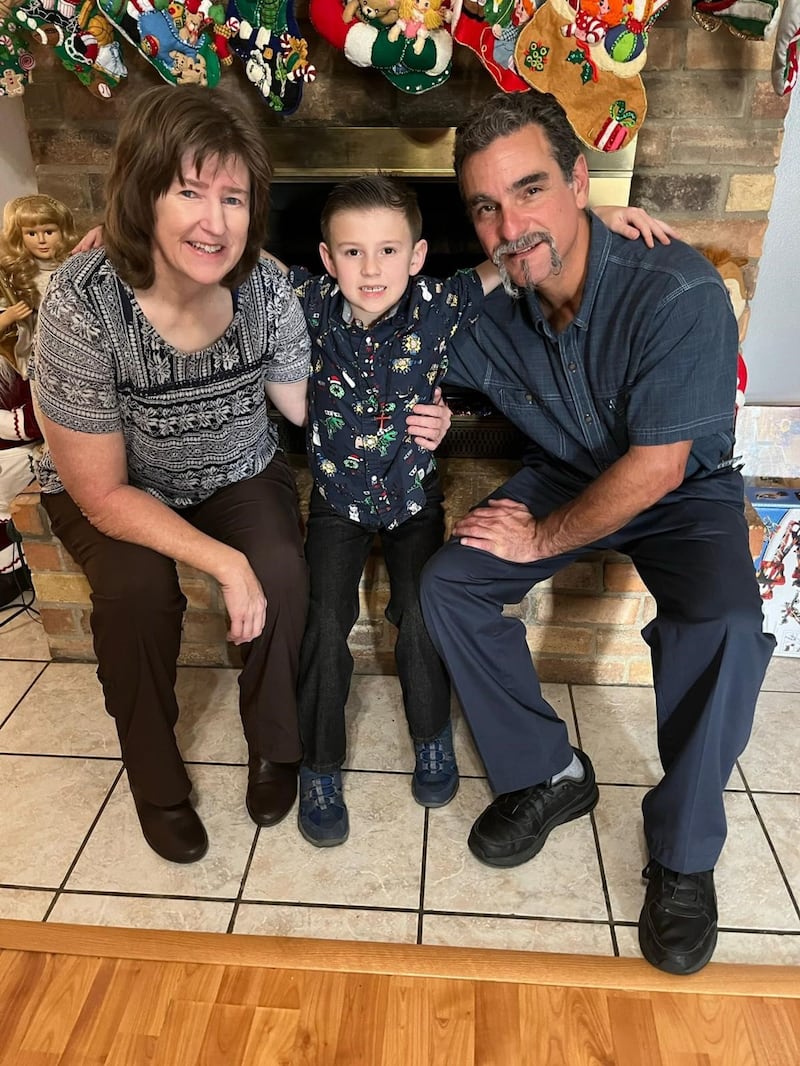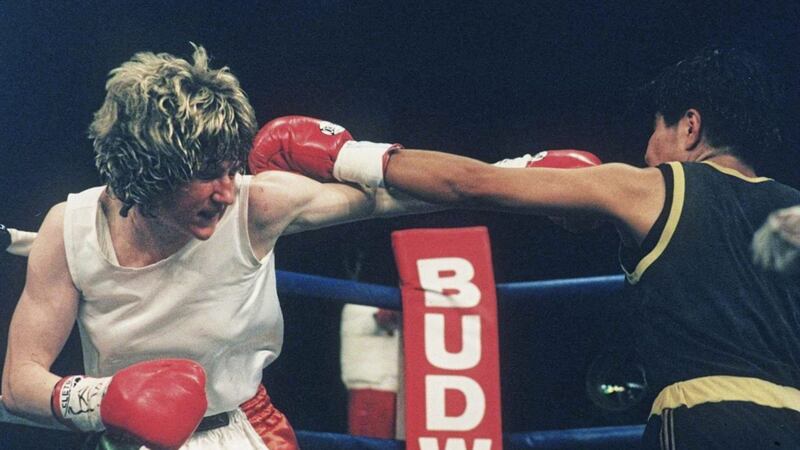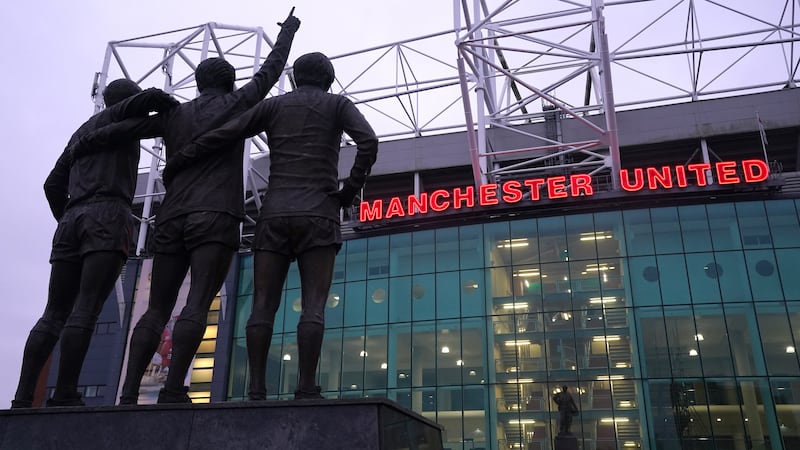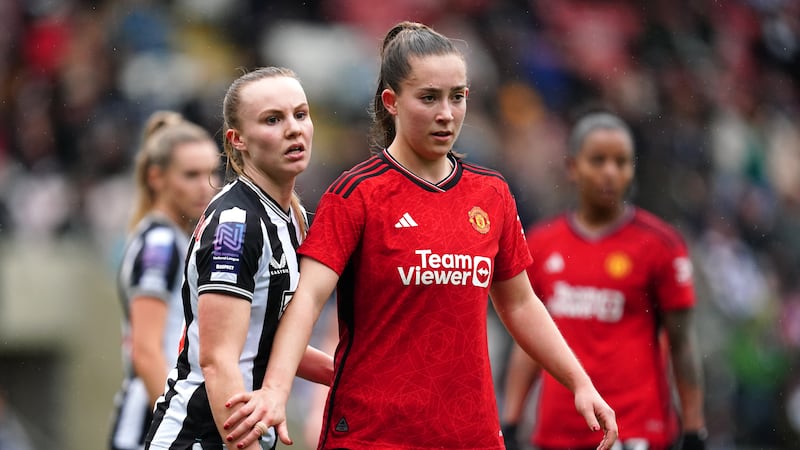IT’S coming up on two years since the big move. Lafayette was the place Deirdre Gogarty called home for the best part of three decades, even though it never quite felt that way. After growing up in the countryside, just a few miles outside Drogheda, city slicking always felt alien; temporary, despite the longevity of her stay.
Boxing brought Gogarty to America’s deep south in the first place. With summer temperatures up around the hundreds, it is an unlikely stop-off for a pale-skinned, fair-haired Irishwoman - though nowhere near as unlikely as the move she was hell-bent on making into a world neither ready, or willing, to make room.
Beau Williford was the man who helped kick down the door.
A former heavyweight and one-time sparring partner of Muhammad Ali, this larger than life giant of the Louisiana scene put his old school reservations aside and welcomed Gogarty in, changing the course of her life for good.
From that point on, their stories are intertwined. Nobody fought Deirdre Gogarty’s corner like Beau because, out there, she had nobody else. Without him, the journey that led to her becoming Ireland’s first female world champion would not have happened.
Even after the gloves were hung up, she stayed close by. When Gogarty married Vic Morrison between the ropes of Beau’s Ragin’ Cajun ring on St Patrick’s Day, 2012, Williford officiated, proud as punch.
It was a bond that went way beyond any traditional notion boxer-trainer dynamic. Theirs was unique. Special.
When Williford died in 2019, everything flipped again. His son Christian was determined to keep Ragin’ Cajun running, Gogarty too, but nothing would ever be the same without Beau.
And just as boxing brought her to Lafayette, the closing of that connection told her it was time to go.
“Ahh, y’know, things have changed quite a bit since Beau passed,” comes the southern drawl on the other end of the line.
It is only then you realise there is no way to compare it against how Gogarty’s accent once was because, throughout her career, Beau did the talking.
Beau was her voice.
“There was nobody else who believed in me as strongly as he did. He believed in me to the point of relentless pursuit of getting fights, promoting and pushing and pushing… you gotta remember, back then they didn’t want women on boxing cards. They really didn’t.
“It was the fear that it would be an embarrassment, a sideshow, a novelty act, a catfight… there was a lot of resistance. You had old school boxing promoters, and it just seemed to turn their stomach, putting women on their show.
“Because I was so quiet and shy, Beau was the one who would brag about me, toot my horn, do all the things I wasn’t comfortable doing. It just… worked.”
That was then.
Along with Vic and their seven-year-old son Celtan, Gogarty and her family headed three hours north-west of Lafayette, relocating to the shores of Toledo Bend Lake.
Boxing, if not quite a closed book, is more than a few chapters past. Gogarty never misses Katie Taylor - whose magnificent career she helped inspire - and still tunes in for the odd big fight night. Other than that, well, life has moved on.
The nearest club is over an hour away but, even if it was next door, the inclination isn’t there. Not at the minute anyhow.
Instead, pitching up in the country feels like a return to her roots, to Ireland and, in some small part, to Mornington, where the seeds of her life’s passion were sown at a time when all else was crumbling around her.
********************
JACK Dempsey might have been first to capture the imagination, but it was the boy from Clones who ignited a dream in Deirdre Gogarty. Staying up to watch Barry McGuigan with her aunt Claire, the buzz when he dropped Eusebio Pedroza in the seventh round was like nothing she had ever felt.
The pair bounced up from their seats and roared in unison, remaining in that position, every sinue tensed, until McGuigan eventually had his hand raised at the end of 15 gruelling rounds.
It would lend itself well to any boxing fairytale if that was the moment Gogarty decided she too was going to be a world champion. That her heart was set on it from that second; tunnel vision, no going back.
The reality, of course, was dictated by the time. Back then, emulating her hero simply wasn’t an option. Never mind strapping that belt around her waist, or fighting in front of thousands, boxing wasn’t just frowned upon for females in Ireland, it was outlawed.
A talented artist who painted some of the cells for the soon-to-be global phenomenon Teenage Mutant Ninja Turtles cartoon after being recruited by creator Jimmy Murakami, other easier, and potentially more lucrative, avenues were available.
Yet she couldn’t, wouldn’t, let boxing go.
A large blue bag, originally full of old sailor’s gear, was stuffed full of foam, old clothes and finished off with newspapers before eventually finding its way into her wardrobe.
An orange peel didn’t quite have the cut of how she imagined a real gumshield would feel, so instead the young Deirdre melted and rolled white candle wax, scorching her palms in the process, before molding the hot wax around her teeth.
There, away from prying eyes, she would go to work, pummeling the makeshift bag until her fists would sting, imagining she was in Madison Square Garden and not Mornington – often fuelled by the fury and frustration of a family falling apart.
Following her parents’ break-up, and with older siblings having already flown the coop, she suddenly found herself rattling around the house in Mornington alone. Often people would knock at the door wanting bills paid while she hid upstairs, pretending no-one was there.
The bag always helped, but sometimes the feeling of worthlessness proved inescapable.
One night she cycled down to the edge of the River Boyne with no intention of making a return journey. But, as he stood there, looking down at the freezing cold water, boxing – and the desperate desire to forge some sort of path within it - brought her back.
“It was the one thing that gave me hope,” she says, “that’s it.
“When I look back on it, I don’t even know why I had so much hope because, from a detached point of view, it didn’t look good.
“I just had a very naïve kinda dream about it all. I really don’t know what would’ve happened to me if it wasn’t for boxing…”
Through sheer force of will, she found a way. Drogheda Boxing Club coach Joe Leonard was the first to let Gogarty through the doors.
After relocating to Dublin, she convinced Pat McCormack at St Saviour’s to give her a shot. It was under his watch that she finally had her first fight, on an unlicensed show in Limerick on June 30, 1991 before being taken to an underground bear-pit in London for a second 10 months later.
In the meantime, she fired off letters to managers and promoters across the US, begging for a chance. Very few responded. Of those that did, topless boxing and mud-wrestling were the unpalatable options on the table.
Beau Williford was intrigued, but unsure. After an initial phonecall, Gogarty mailed a video of her two fights to Lafayette. Days later, the phone rang again.
“Deed-dra, I just watched your tape,” he said, “you’re one baaaaad mother.”
Without pause for thought, away she went.
A marriage made in heaven with the benefit of 20-20 hindsight perhaps, but there were plenty of times Gogarty wondered just what the hell she had got herself into.
Tough love was the currency inside Beau’s chicken barn gym on the edge of town, a crayfish boiler bubbling over in the corner, cranking up an already oppressive heat as Gogarty was sparred as hard, and as often, as any of his other fighters – all of whom were male.
Plenty came and went, but there was no quit in his latest recruit.
“It was really sink or swim. You had to earn their respect the hard way - and it was hard!
“There were times I was very depressed, extremely lonely… for a long period of time I cried every single weekend, especially the first year living in the States.
“But there was no turning back. Once you’re into something that deep, and you’re trying to make an opportunity for yourself, you can’t go back. You have to make it work.
“There was an awful lot on the line, a lot to prove. It was something that hadn’t been done before so there were a lot of sceptics, even people very close to me were advising against the whole thing, but I had to keep going no matter what.”
Outside the ring she took waitressing jobs around graphic design work at a trophy shop – anything to sustain the dream, even if hometown decisions, late notice calls and huge jumps in weight just to get a fight were obstacles to her lofty ambitions.
The money varied but was seldom anything over a few hundred dollars which, once expenses were deducted, left little in the pot. Just being happy to be there was no longer enough, especially when two world title challenges came and went without the loot.
But then, just as hopes were starting to fade, the breakthrough finally came - not just for Deirdre Gogarty, but for the sport she loved.
********************

WHEN Mike Tyson walked to the ring, the world stopped. It had been that way since a teenage ‘Iron Mike’ bludgeoned his way to the top and, even after spending three years in jail for rape, fight fans couldn’t stop themselves coming back for more.
Having blown away Peter McNeeley and Buster Mathis upon his release, the 1996 rematch with newly-crowned WBC champion Frank Bruno was seen as the first real test of Tyson’s mettle in this second phase of his career.
Ten days out from that March 16 showdown, Deirdre Gogarty received a call from Williford – ‘Christy Martin, Tyson-Bruno undercard, Vegas… you in?’
Martin, known as ‘The Coalminer’s Daughter’, was the female Tyson. Tough, rugged and with a hammer of a right hand, she could talk the talk as well as walk the walk.
A walkover showcasing the face of female boxing on one of the pay-per-view bills of the year was anticipated across the board. Even Tyson, Gogarty recalls, sent a rueful grin in her direction at the weigh-in.
“As if to say ‘you’re f**ked…’”
But she was in alright, no matter what physical advantages she was giving away.
“I remember Beau checking my weight a few hours before the weigh-in, and being furious because I was 124 pounds and the fight was set for 135 pounds. There couldn’t be more than seven pounds of difference or they’d pull the fight.
“So he sent me off to the buffet while he headed straight to the casino, eventually reappearing with a bag full of rolls of quarters for me to stuff into my pockets, socks, knickers, bra, to make sure I made the weight.
“It was a chance of a lifetime. I couldn’t afford to miss it.”
What materialised, hours before the main event, was a fight so dramatic and so damn good it has been dubbed the female ‘Thrilla in Manilla’.
Broadcast to millions across the world, eyes were at last beginning to open. Last year Netflix released a documentary chronicling Martin’s remarkable life story, and paying homage to the part Gogarty played in a seminal moment for women’s boxing.
Devastated at losing out, the significance of that night still took some time to sink in. After all, Tyson and Bruno split a purse of $36 million. Christy Martin received $15,000. Gogarty? $3,000, out of which she still had to pay her manager and cornermen.
Day by day, though, awareness grew.
“My boss at the trophy shop hadn’t even wanted to let me off work for the lead-up to that fight, and then the Monday after we were sitting there, and a co-worker came and told me Howard Stern was talking about the fight on the radio...”
Stern, a shock-jock on American airwaves renowned for the sharpness of his tongue, famously took no prisoners. The blood drained from Gogarty’s face.
“I was really cringing. You know how he rips people apart, and I was just waiting, and waiting… but he didn’t. He was very respectful. If Howard Stern doesn’t rip you apart, maybe you’re onto something.
“People like me and Christy, we already knew women could fight, it was no surprise to us. But when other people started to realise that, it felt like we’d broken across. Like the tide had turned.”
Acclaim was one thing, but that alone couldn’t satisfy her soul. Within a year, though, Deirdre Gogarty finally got what she came for when victory over Bonnie Canino secured the world title strap at the third time of asking – and, taking home $12,500, the biggest payday of her career. Except…
“You know I never got paid for that?” she sighs, “no, we never got a penny. Nobody on that card got a single cent. The promoter, I dunno, he claimed he didn’t bring in enough money to pay anybody. So the biggest purse of my life, and I never saw any of it.
“Unfortunately making money was never one of my talents…”
Gogarty lets out an exasperated giggle. Twenty-five years down the track you can do that. But had she finished up without that belt, there would be nothing to laugh about.
“If I didn’t win a world title, I would’ve seen it as a total failure. So that made it all worth it, because it’s something nobody can ever take away from me.
“That kinda drive I had is really God-given – you can’t just decide to have it. It has to come from within. There’s probably never going to be anything else in my life that I’ll have that drive for… I think I’d know it by now if there was.”
And there’s pride too in the trickle-down effect created. In the midst of her own career, she recalls receiving a letter from a young Katie Taylor, expressing her admiration, and the hope that “one day they might even let us into the Olympics”.
Gogarty’s showdown with Christy Martin might have been a catalyst for change, but progress was still slow in coming. The baton was finally passed when, the day after the release of her autobiography, My Call to the Ring, Taylor whirled around the ring having won gold at London 2012 - the first Games to include women’s boxing.
Coincidence, fate, call it what you will. A decade on Taylor – and plenty of others – are topping pro bills and standing shoulder to shoulder with their male counterparts. They owe much to those who blazed a trail when the boxing world wouldn’t listen.
“I remember Pat McCormack telling me ‘you’re opening the door for girls in 10, 15, 20 years’ and it used to kill me, but he was so right.
“I see these women now with multiple belts, these beautiful records… it was just a different landscape back then. I learned about boxing reading about Jack Dempsey, so my mindset was that I’d fight anybody anywhere, any time for anything. I wouldn’t even question it. That’s what it took to get noticed.
“Of course I wish things had been different for us, but I’m thrilled they have the platform and the stardom now.”
Due recognition has come, eventually, for Deirdre Gogarty too. There’s the motion picture, back on track after Covid-enforced delays, induction into the international women’s hall of fame, while the possibility of erecting a statue in Drogheda has also been discussed.
“I really don’t like to toot my own horn, but that would be phenomenal.
“Y’know, since Beau, boxing just feels like a different lifetime. In a lot of ways I feel like I spent myself all up on boxing, but having my son is a great motivation and I think I needed that.
“Honestly, I’m just glad people haven’t completely forgotten about me.”





